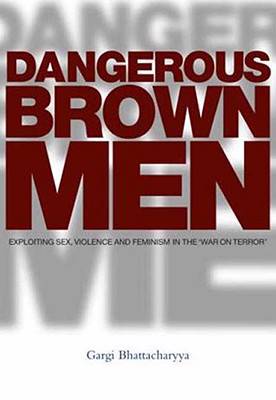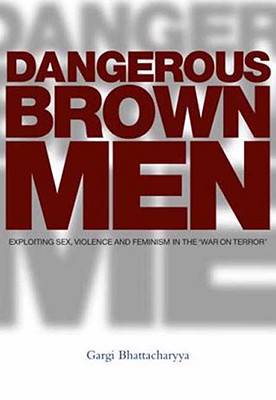
Bedankt voor het vertrouwen het afgelopen jaar! Om jou te bedanken bieden we GRATIS verzending (in België) aan op alles gedurende de hele maand januari.
- Afhalen na 1 uur in een winkel met voorraad
- In januari gratis thuislevering in België
- Ruim aanbod met 7 miljoen producten
Bedankt voor het vertrouwen het afgelopen jaar! Om jou te bedanken bieden we GRATIS verzending (in België) aan op alles gedurende de hele maand januari.
- Afhalen na 1 uur in een winkel met voorraad
- In januari gratis thuislevering in België
- Ruim aanbod met 7 miljoen producten
Zoeken
Dangerous Brown Men
Exploiting Sex, Violence and Feminism in the 'War on Terror'
Gargi Bhattacharyya
Paperback | Engels
€ 69,45
+ 138 punten
Omschrijving
Why is the public presentation of the war on terror suffused with sexualised racism?
What does this tell us about ideas of gender, sexuality, religious and political identity and the role of the state in the Western powers?
Can we diffuse inter-ethnic conflicts and change the way the West pursues its security agenda by understanding the role of sexualised racism in the war on terror?
In asking such questions, Gargi Bhattacharyya considers how the concepts of imperialism, feminism, terror and security can be applied, in order to build on the influential debates about the sexualised character of colonialism. She examines the way in which western imperial violence has been associated with the rhetoric of rights and democracy - a project of bombing for freedom that has called into question the validity of western conceptions of democracy, rights and feminism.
Such rhetoric has given rise to actions that go beyond simply protecting western interests or securing access to scarce resources and appear to be beyond instrumental reason. The articulations of racism that appear with the war on terror are animated by fears and sexual fantasies inexplicable by rational interest alone. There can be no resolution to this seemingly endless conflict without understanding the highly sexualised racism that animates it. Such an understanding threatens to pierce the heart of imperial relations, revealing their intense contradictions and uncovering attempts to normalise violent expropriation.
What does this tell us about ideas of gender, sexuality, religious and political identity and the role of the state in the Western powers?
Can we diffuse inter-ethnic conflicts and change the way the West pursues its security agenda by understanding the role of sexualised racism in the war on terror?
In asking such questions, Gargi Bhattacharyya considers how the concepts of imperialism, feminism, terror and security can be applied, in order to build on the influential debates about the sexualised character of colonialism. She examines the way in which western imperial violence has been associated with the rhetoric of rights and democracy - a project of bombing for freedom that has called into question the validity of western conceptions of democracy, rights and feminism.
Such rhetoric has given rise to actions that go beyond simply protecting western interests or securing access to scarce resources and appear to be beyond instrumental reason. The articulations of racism that appear with the war on terror are animated by fears and sexual fantasies inexplicable by rational interest alone. There can be no resolution to this seemingly endless conflict without understanding the highly sexualised racism that animates it. Such an understanding threatens to pierce the heart of imperial relations, revealing their intense contradictions and uncovering attempts to normalise violent expropriation.
Specificaties
Betrokkenen
- Auteur(s):
- Uitgeverij:
Inhoud
- Aantal bladzijden:
- 176
- Taal:
- Engels
Eigenschappen
- Productcode (EAN):
- 9781842778791
- Verschijningsdatum:
- 1/08/2008
- Uitvoering:
- Paperback
- Formaat:
- Trade paperback (VS)
- Afmetingen:
- 137 mm x 208 mm
- Gewicht:
- 226 g

Alleen bij Standaard Boekhandel
+ 138 punten op je klantenkaart van Standaard Boekhandel
Beoordelingen
We publiceren alleen reviews die voldoen aan de voorwaarden voor reviews. Bekijk onze voorwaarden voor reviews.









